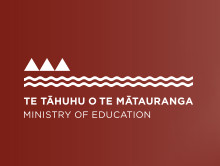Pakakē ana
Nā Tangihōro Fitzgerald
This story is an action filled narration of a rugby game in progress.
'Pakakē ana' story by Tangihōro Fitzgerald, with page numbers from He Kohikohinga 34.
| P.20 |
Titiro atu ki a Hēmi.
Look at Hēmi. |
| P.21 |
Titiro atu ki a Poi.
Look at Poi. |
| P.22 |
Titiro atu ki a Tai.
Look at Tai. |
| P.23 |
Titiro atu ki a Rōpata.
Look at Rōpata! |
| P.24 | Pakakē ana te tū a tōna ringa! Look at his hand go up! |
Te Reo Māori in the curriculum
Strand: Reading (Writing)
Level: 3
Duration: 30 minutes x 3
Achievement objectives:
The student will be able to read texts and complete set tasks (guided reading):
- to collate information from texts
- to select information from simple texts relating to a specific topic
- to identify main ideas and supporting details from a text.
Essential skills
Social and co-operative: Works co-operatively with others to achieve a common goal.
Problem solving: Demonstrates enjoyment of problem solving activities.
Other curriculum areas:
Social studies – Social organisation: How participation within groups involves both responsibility and rights.
Activities to support the achievement objectives
1. Teacher directed
- All together, read the story. Hand out paper and pencils.
- Groups will discuss the questions. They must all agree before they write the answers.
- Choose a page and write five sentences about the strengths of a character well known to you.
Questions:
- Who are the characters in the story?
- What type of sport is being played?
- Name four things you know about this game.
- Name two things the characters are good at.
- Name two things that help them play well.
- Name a time when you worked well in a team.
2. Teacher directed
- Working in pairs, have children draw two lines on their paper.
- Write 'Proper nouns' in one column, 'Verbs' in the center and 'Common nouns' in the last column.
- Create your own story in the three boxes.
Questions:
- What examples of team work in the home, in a kapahaka and on the marae, can you think of? (Write three sentences about each).
3. Teacher directed
- Working in pairs, plan to interview a competitor from the story.
- Think of 8–10 open-ended and worthwhile questions, and write them down.
- Leave a space between each question for the answers.
- When the first pair of interviewers have finished, they swap with their friends.
- The class can use the results of these interviews to role play a radio talk show.
Questions:
What kind of expression would you display in your voice for the following sentences?
- George the winger is never going to get caught.
- The ball is right on target and then 'Oh no!' The wind has blown it outside the uprights. 'What a shame!'



